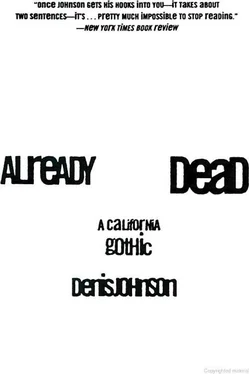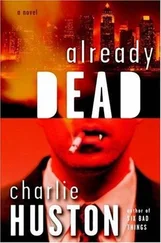A man in rags and a Rasta cap and a dozen yardlong blond braids with bells on the ends, his feet in slippers with the tips curling up, his eyes as empty and blue as outer space, danced heel and toe with his arms outstretched, danced like a Hindu god. He stopped still and smiled and pitched over directly backward, making a mysterious percussive sound on the pavement with his head. Merton was glad.
Two teenaged girls sang, “All we are saying — is give peace a chance,” three times and then stopped.
A crowd had closed around the blond Rastafarian. Among them Merton spied his own wife, Kimberly.
Like a flagstaff they upraised him to the vertical. Your coma, Already Dead / 241
Merton thought, is now public and recognized. But the man hadn’t stopped smiling. “That was a thing !” Kimberly came over. “He’s all right.”
“I doubt if that’s possible. What do you think you’re doing?”
“Doing?”
He’d made her mad just like that. He looked away.
The litter can was full and letting out little kites of jetsam into the wind. A kid whose mother’s boyfriend he’d once arrested skate-boarded past, smiling at Merton and scratching the tip of his nose with his middle finger.
He linked arms with his wife. “So you came.”
“They’re going to make war over oil.”
“Yeah. Well. Everybody’s out here squawking, but your real vote goes in your tank. We vote with our dollars.”
“You sound like a cop. I hate to say it, hon, but you do.”
“What do you mean?”
“Above it. Aloof. Seen it all, no more passion for you. People are monkeys.”
“Martians.”
“Yeah.”
“Yeah. They are. Let’s get behind a bush and do it.”
“You’re on duty!”
“One Martian to another. I’d consider it an honor. I’m here to service the public.”
A man he’d arrested last month for assault with a beer pitcher stood in the pickup’s bed with the bullhorn dangling at his hip, speaking without benefit of its juice: “The president has one job. Lie. Lie like hell.
The Joint Chiefs have one job. Kill. Kill ’em all. I did a tour in the marines, and that’s what it’s all about, it is not about anything else, folks, it’s about killing. If we continue to let these assholes solve our problems then that’s what we’re gonna get for the rest of history — lying and killing, killing and lying. Away with government!” He raised the bullhorn to his fat beard. “ANARCHY! ANARCHY! ANARCHY! ANARCHY!” Nobody else took up the chant, and he smiled around and handed the device down to someone else — to Kimberly.
She stepped up to take the man’s place. She’d gotten heavy, ungraceful, particularly in the hips and thighs. Merton didn’t mind, not often, anyway, but now he minded. Kimberly raised the horn, 242 / Denis Johnson
spoke in a thin piping tone, examined the equipment, got the button right. “I JUST WANT TO ADD MY VOICE,” she said. “LET’S NOT
HAVE THIS WAR.” She lowered the thing, looked around at expectant neighbors, lifted it to her mouth. “I DON’T KNOW WHAT ELSE TO
SAY BUT THAT. THANK YOU.”
A few old acidheads applauded. They’d gotten up out of their graves to attend this thing. Around them orbited two kids on bikes, shot forward stiff-legged over the handlebars like gargoyles or bowsprits, hopping the curbs. He drilled them with a glance and waved his finger and shook his head, and at that moment elected, forever in his soul, to quit the police before much longer and run against the mayor. Kimberly could go to work. She had a nursing license.
Fairchild zigzagged the small room in the Gualala Hotel, holding up his whites by the waist. “Where’s my belt?
Where’s my belt?”
“You look like a monkey in his cage,” Melissa said.
“I’m happy to amuse you.”
“A chim pan zee.”
“Delighted you’re delighted.” He opted for getting his shirt on, snatched it from the floor, and uncovered the belt beneath it. Just these white socks — just these canvas shoes — these laces — these slow purgat-orial tortures. “I believe we’re way the hell past checkout,” he said.
She pulled the sheet up taut over her head.
The intimations of her shape and the blindness and innocence of her intimated face; and suddenly he wasn’t terrified anymore.
“I know everything.”
“Oh! My God! Are you starting again?”
“I just want you to know I know.”
“Then wonderful! Maybe you didn’t realize that I realize that you realize!”
Leaning against the door frame, he put his face in the crook of his arm and laughed.
“Get out!”
“Take off your shroud and look at me.”
“Get out!”
Downstairs he searched for someone at the desk whom he might Already Dead / 243
inform that he wasn’t paying for another day. But they were all out back gambling or in the john sniffing paint. Bills, requests, complaints might be dealt with also in the barroom; but he didn’t want to cross its border. He’d ended up in there last night, and even at this moment, standing before a vase of richly colored flowers, he heard the strains of his own laughter still ricocheting among its walls. And somewhere outside, a robot’s amplified voice crying, Anarchy! Anarchy! Anarchy! —Yesterday Yvonne in the middle of your phony seance the ground opened up. I saw the depth of my danger. I cried out my last words, I shouted my love to my wife. I went to the preacher. I went to my father’s grave. And then to the hotel bar, the cathedral of parched souls with its big screen of heaven and in every hand a cigarette smoking like a nightsome, griefly thurible. I dived deep into the woman I no longer love. And all the time it tasted and sounded like any other day, I went to sleep terrified and woke up falling forever, and only the sight of her beneath the sheet like half a thought, like a tentative scribble, saved me—
But only, he sensed, momentarily. The wooden floorboards boomed under his steps, and he stood outside under a hot blue stratosphere squinting and trying to recognize his car. Something was happening out back, in the region that passed for Gualala’s shopping mall. The fruit stand was trading briskly. Somebody was making a speech through a bullhorn from the back of a pickup truck. A crowd of several dozens had collected. People: shocks of straw, ready to break out in flames, disintegrate into ash. He was seeing too much. Before his eyes a kid on a bike ran over a quarter section of watermelon, turning it to bloody — There it is.
And how good its leather, and how it howls. All the way up to the ridge in second gear.
Off the ridge road he had to go carefully, passing two or three quiet, dusty homes before reaching his brother’s land. He coasted to the side of the drive where it deteriorated into its ruts and little washes, and left the Porsche and set out walking, easily, as it was all downhill. He muddied his knees at the spring halfway along, and continued, wiping the water from his mouth and the sweat from his eyes. When he heard a motor somewhere behind him, he climbed a few yards up the bank to his right, realized he couldn’t get out of sight quickly enough, clambered back down and across the road and huddled in back of a pungent bull pine as a jeep passed by: Billy’s 244 / Denis Johnson
International Scout, and it looked like Clarence Meadows at the wheel.
The vehicle blinked out around the next bend, and Fairchild resumed his own descent through its hovering exhaust. The sweetness of his exile, the shelter of these trees, their surrounding staunch idiocy, he took these things to his heart: he knew what Billy meant when he said the radar couldn’t get him here. He’d give the Porsche to Clarence, give it to him free. If Billy wouldn’t have him in the cabin then he’d camp right here for his lifetime, close by the clean trickling spring.
Читать дальше












